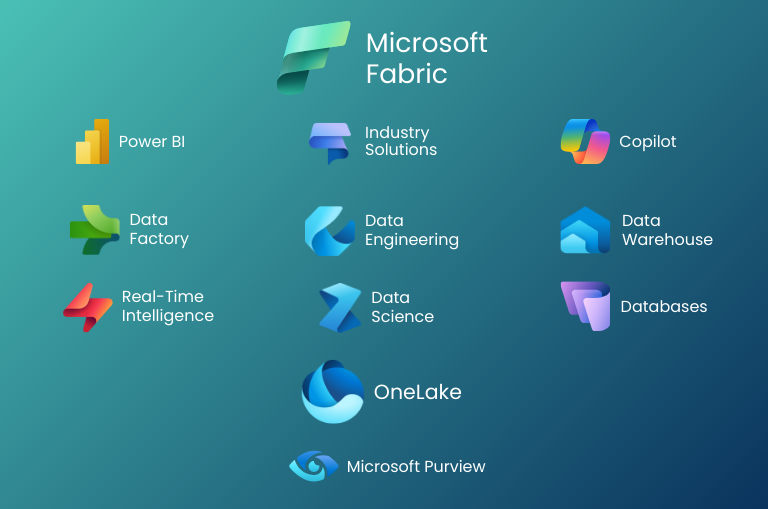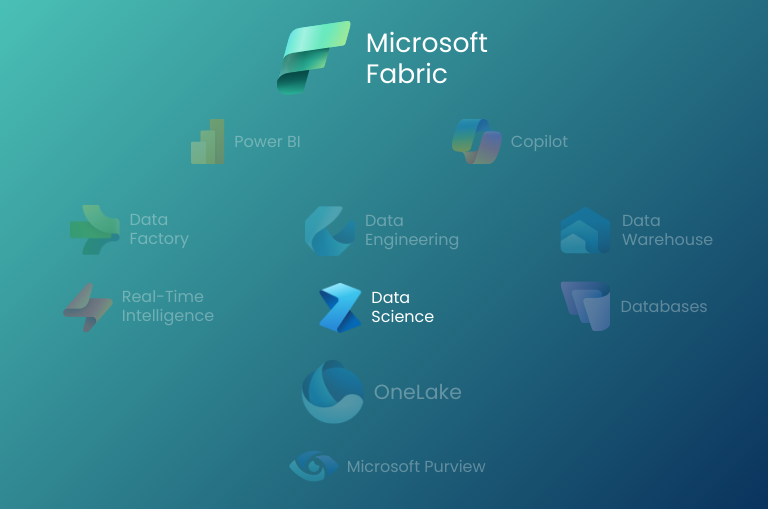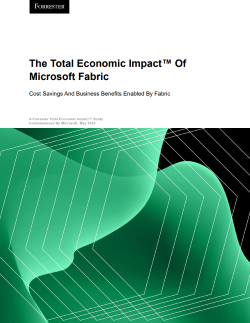What is Data Science in Microsoft Fabric
Artificial intelligence is changing the rules of the game in business, but its effectiveness depends on one key resource: data.
How to transform raw information into a strategic advantage that will drive growth and innovation in your company? This challenge requires not only gathering data, but above all, intelligently preparing it, processing it, and turning it into valuable analyses – the true driving force of a modern enterprise.
Data, however, does not function in isolation from context – people and appropriate technologies are equally important. Experts combine business knowledge with advanced analytical methods, and innovative platforms such as Microsoft Fabric Data Science provide the necessary tools to carry out even the most complex analytical tasks effectively.
In practice, this means that companies can respond more efficiently to market challenges, optimise operational processes, and identify new growth opportunities. As a result, AI-driven transformation becomes a reality available not only to global corporations but also to smaller, dynamically developing organisations.
What is Microsoft Fabric?
Microsoft Fabric is a comprehensive, integrated data and analytics platform designed for enterprises seeking a simple yet versatile solution for collecting, processing, and analysing information. The platform operates in a SaaS (Software as a Service) model, ensuring ease of use, high scalability, and security.
The key premise of the platform is the unification of resources and services in one consistent environment. Instead of integrating solutions from different providers, Microsoft Fabric offers a unified technology stack based on Microsoft Azure cloud, which streamlines the work of both business teams and IT specialists.
Data in Microsoft Fabric is stored in OneLake – a central repository eliminating the need to use multiple, often dispersed, data storage systems. This allows companies to manage access more effectively, maintain data consistency, and ensure compliance with regulations.
Built-in artificial intelligence (AI) mechanisms help to better understand data and use it in Microsoft Azure AI Services and specific applications, from real-time reporting to advanced machine learning modelling available in Microsoft Azure AI Foundry.
One of the most innovative elements of the platform is Microsoft 365 Copilot, an integral part of Fabric. Copilot is an assistant based on generative artificial intelligence (GenAI) that automates routine tasks, fills gaps in expertise, and suggests optimal data operations. As a result, users can create reports faster, formulate queries, and implement data engineering processes without the need to write complex scripts.
Moreover, Copilot analyses the context of data and tailors suggestions to specific business needs. As a result, organisations using Microsoft Fabric, supported by Microsoft Copilot, gain an integrated environment for efficiently combining data from various sources such as Microsoft Dynamics 365 Sales, designing advanced analytical pipelines, and using machine learning algorithms as well as ready-made large (LLM) and small models (SLM) in everyday work.
This cohesive platform significantly reduces administrative costs, accelerates the implementation of new projects in Power Platform and Microsoft Copilot Studio, and effectively supports teams at all levels in maximising the potential of information.
What applications are included in Microsoft Fabric?
Microsoft Fabric is a package of services with wide applications across the entire data processing and analysis cycle. It offers a unified platform in which each component plays a key role in the ecosystem.

This gives companies versatile tools for migrating, managing, and analysing data, as well as creating innovative AI solutions.
- Fabric Data Factory - This is a modern tool for integrating and preparing data from various sources. It allows the automation of ETL/ELT processes, task scheduling, and fast transfer of even gigantic volumes of information to target data warehouses. In addition to a rich library of connectors, Data Factory provides mechanisms functional in AI transformation, such as built-in support for intelligent data flows. Thanks to its simple interface, both experienced programmers and business specialists can quickly create data pipelines without the need to write complicated scripts.
- Fabric Data Engineering - A module created for teams specialising in advanced calculations and data engineering. It offers a Spark cluster-based environment, enabling fast processing of massive datasets and integration with other Fabric components. This fosters the creation of scalable machine learning projects, supported by configurable tools and libraries.
- Fabric Data Warehouse - A high-performance data warehouse designed with scalability and flexibility in mind. It allows the separation of computing resources from storage, enabling users to manage performance and costs independently. It supports the native Delta Lake format and integrates seamlessly with other services.
- Fabric Databases - Facilitate the management of relational and custom data structures in a centralised environment. They allow quick replication of data from various sources and consistent scaling for transactional and analytical applications.
- Fabric Data Science - A module that simplifies the design, training, and deployment of machine learning models. It supports integration with Azure Machine Learning and provides a set of tools that facilitate experiments and model lifecycle management.
- Fabric Real-time Intelligence - Provides instant collection and processing of streaming data, enabling real-time event monitoring and log analysis. This allows companies to respond quickly to dynamically changing business conditions based on current data.
- Fabric Power BI - A well-known and valued tool for visualisation and interactive data analysis. In the Fabric environment, it provides easy access to all resources in OneLake, speeding up the creation of reports and dashboards.
- Copilot in Fabric - Copilot is an AI assistant that supports users in automating tasks related to data transformation, cleaning, and modelling. Its ability to generate suggestions and code significantly accelerates the implementation of new analytical processes and learning how to use the platform.
- Fabric OneLake - A central data repository where all files and tables are collected. Thanks to consistent storage, information can be easily shared across different Fabric moduless and data duplication can be avoided.
- Microsoft Purview - A comprehensive solution for data governance and security. It allows monitoring the flow of information within Fabric and establishing governance and compliance policies.
- Fabric Industry Solutions - Provides dedicated industry-specific data solutions that form a solid foundation for data management, analysis, and key decision-making. These solutions address the specific challenges of different sectors, enabling companies to optimise processes, combine data from many sources, and use advanced analytical tools.
Microsoft Fabric connects all these areas into a unified data platform, offering the most comprehensive platform for big data analysis across the industry. Fabric enables organisations and individuals to transform large and complex data repositories into practical operational solutions and business analyses.
Cloud Data Science systems play a key role in processing the growing amounts of data, supporting companies in making data-driven decisions. Unified platforms such as AWS, Azure, or Google Cloud integrate tools for analytics, machine learning (ML), and data management, eliminating data silos and simplifying analytical processes.
Future and market of cloud Data Science systems
Cloud Data Science systems play a key role in processing growing amounts of data, supporting companies in making data driven decisions. Unified platforms such as AWS, Azure or Google Cloud integrate tools for analytics, machine learning (ML) and data management, eliminating data silos and simplifying analytical processes.
Growth of the Data Science platforms market: The value of the global Data Science platforms market will reach USD 13.55 billion in 2025, with a CAGR of 22.8%, reaching USD 57.07 billion by 2032.
- Data expansion: By 2025 the global amount of data will reach 181 zettabytes, significantly increasing the demand for advanced analytical tools.
- Cloud adoption: Gartner predicts that by 2025 as much as 75% of enterprise data will be generated and managed outside traditional data centers.
- Integration of AI and ML: Forrester points to a 40% increase in adoption of AI services in the cloud by 2025, driven by the needs for automation and personalization.
- Spending on data analytics: As many as 87% of companies have increased investments in data, highlighting its strategic importance for modern enterprises.
Benefits of unified platforms:
- Scalability: The cloud offers flexible pay as you go models, enabling resources to be adjusted to changing needs.
- Democratization of analytics: Thanks to intuitive interfaces and low code/no code solutions, analytics is accessible also to people without advanced technical skills.
- Cost optimisation: Unified platforms reduce infrastructure and data management costs.
- Operational efficiency: Integration of AI and ML accelerates decision making processes through predictive models and automation.
Cloud Data Science systems are the future of data analytics, enabling companies to effectively leverage the potential of Big Data and AI."
What is Fabric Data Science?
Fabric Data Science is an intelligent analytics ecosystem within Microsoft Fabric that supports the entire data lifecycle – from preparation and engineering, through AI model building and training, to integration with reporting and management.

This enables the creation of comprehensive solutions based on machine learning or deep neural networks, without constantly switching between multiple tools. The platform combines several key components:
-
Advanced Data Engineering – Enables AI models to be fed with the required amount of information easily, including automation features.
-
Integrated Collaboration – Business and technical teams can share notebooks, scripts, and data within a single accessible platform.
-
Real-Time Analytics – Processes streaming data on the fly (so-called Real-Time Intelligence) and enables immediate responses to changes.
-
AI Powered by Copilot – Built-in Copilot mechanisms simplify daily model development, suggesting code snippets and optimal analytical solutions.
Importantly, Fabric Data Science integrates with OneLake – the central repository of all organisational data within Fabric. This means no need to copy or move files and faster discovery of required information.
In practice, a company gains the ability to efficiently create, deploy, and maintain AI models that truly transform decision-making. The platform's flexibility enables parallel work by multiple specialists, from analysts and data scientists to business teams, fostering rapid idea incubation.
Additionally, with Copilot's continuous development, users can expect new features that support automation and process optimisation. Fabric Data Science is, therefore, becoming a leading solution, combining computational power, a clear work environment, and AI assistance in daily tasks.
Who is Fabric Data Science for?
Fabric Data Science is aimed at a wide audience: from those taking their first steps in data analysis, to experienced data scientists, to managers responsible for business strategy.
Thanks to its simple interface and Copilot's built-in suggestions, even those without advanced technical experience can build basic AI models and use analytics dashboards.
More advanced users will find rich capabilities for connecting to diverse data sources and a full suite of tools for data engineering and training complex algorithms.
Ultimately, anyone looking to streamline business processes, obtain more accurate forecasts, or speed up product and service development will benefit from Fabric Data Science.
How to Use Fabric Data Science in Business
Fabric Data Science can be applied in many business scenarios:
-
Sales Analysis: Track customer behaviour data and build recommendation models to increase revenue.
-
Trend Forecasting: Predict product demand and upcoming market changes using built-in tools.
-
Cost Optimisation: Identify areas for savings through detailed analysis of financial and logistics data.
-
Offer Personalisation: Tailor marketing communications based on past customer interactions with your brand.
-
Team Support: Use built-in AI features like Copilot to code, test, and deploy analytics solutions faster.
Benefits of Using Fabric Data Science
At its core, the platform simplifies and accelerates analytical processes. It brings together in one place all the tools needed to work with data, eliminating problems caused by using multiple disparate solutions.
Users get a clear environment where data is always available, and analysis results can be implemented into business processes more quickly.
Additionally, the Copilot feature assists in writing code and preparing models, allowing even less experienced users to create AI projects based on best practices. As a result, companies achieve better forecasts, higher service personalisation, and smoother communication between departments.
Benefits of Using Fabric Data Science in AI Transformation
Integrating Data Science with AI processes in a company offers numerous advantages:
-
Faster Deployments: Ready-to-use data tools and AI models enable quick process automation.
-
Elimination of Data Silos: OneLake and a shared work environment simplify the integration of company-wide data.
-
Ease of Learning: Copilot helps configure necessary components and provides guidance for each line of code.
-
Scalability: The solution grows with the company, supporting increasingly advanced AI projects.
How Data Science Integrates with Other Microsoft Fabric Modules
Data Science in Fabric is one of the core elements of the Microsoft Fabric ecosystem, alongside components like Data Engineering, Data Factory, Real-Time Intelligence, and Power BI. All these modules share a single data layer called OneLake, meaning that once uploaded, data is available to multiple tools without the need for migration.
Additionally, Copilot works across the entire environment, providing intelligent assistance for creating queries, writing code, and even preparing reports.
This allows all parts of the solution to work together seamlessly – for example, once the Data Engineering team completes the data cleaning process in Data Factory, the data automatically becomes available in Fabric Data Science, where it can be modelled and shared with teams analysing results in Power BI. This unified chain leads to more effective business operations.
ROI of Implementing Microsoft Fabric Unified Data Platform

The Forrester report The Total Economic Impact™ Of Microsoft Fabric (TEI) shows that Microsoft Fabric delivers 379% return on investment (ROI) over three years with 9.79 million USD NPV. Analysing a company with revenues of 5 billion USD, Fabric increased data engineer productivity by 25% (1.8 million USD savings), increased business analyst efficiency by 20% (4.8 million USD savings) and generated 3.6 million USD in profits through better decisions.
Infrastructure savings reached 779 thousand USD, and employee retention improved by 8%. The unified platform integrates data engineering, storage, science, and real-time analytics, eliminating silos. The SaaS model and intuitive interface enable data availability across the organisation, supporting data-driven strategies, according to the Forrester TEI study commissioned by Microsoft.
Summary
Implementing Microsoft Fabric, along with its Data Science module, integrates data management and analytics into one platform, streamlining data preparation and AI model building. Combined with Microsoft Power BI, this enables rapid transformation of complex data into clear visualisations and interactive reports, supporting fact-based decision-making. Introducing Microsoft 365 Copilot into the organisation brings an intelligent AI assistant into everyday work tools, automating tasks and boosting productivity. Together, they form a cohesive ecosystem that maximises the value of data and AI, driving innovation and efficiency across the organisation.
Microsoft Fabric Data Science is a comprehensive solution that helps companies process data, extract insights, and translate them into concrete actions in a simple and effective way. Thanks to its integration with other Microsoft Fabric modules, such as Data Engineering, Power BI, and Real-Time Intelligence, the entire data analysis process can take place in one environment, significantly improving responsiveness to changing market conditions.
The simultaneous presence of AI tools, led by Microsoft Copilot, accelerates team workflows and eliminates common errors in manual algorithm deployment. Thus, Fabric Data Science not only streamlines existing processes but also fosters the development of innovative ideas, enabling new products, personalised customer engagement, and better supply chain management. Clearly, Fabric and its Data Science module are key to effective AI transformation.

